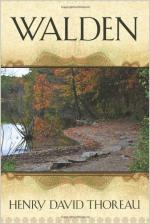|
|
Walden Winter Animals
Thoreau discovered a new view from the center of the pond when was frozen over. From there, he saw more extreme things than he ever had before.
Topic Tracking: My House Outdoors 5
Walden Pond was his yard, without snow. He skated and slid on it.
The hooting owl returned to Walden in the winter - familiar and regular. There was also a goose who was loud and alarming, as if chasing people out of the area. Yet, despite this noise, Walden was welcoming like no other place. Even ice whooped in response to the daily fluctuation of temperature and sun. The foxes came in groups, sometimes to Thoreau's door, then retreated. They seemed as if they had some sort of civilization themselves. The red squirrel woke Thoreau at dawn, running up and down the side of the house. It would spend its day eating sweet corn, running back and forth constantly. Then the jays came to eat the corn. They were dumb and always choking themselves on the kernels. Chickadees came too, but they did not choke. They pecked at each kernel till they could swallow a piece. Then there were the mice, which ate Thoreau's crumbs and lived inside the house. One day a sparrow landed on his shoulder, which Thoreau considered a great honor. The squirrels and he got to be very familiar with each other, and they began to run across his shoe. Partridges came to his yard only just before and after there was a full snow cover.
The hounds often came nearby, hunting for fox. There once was a man from Lincoln who came to Thoreau's door looking for his dog. But upon finding Thoreau he was so curious about Thoreau's purpose in living at Walden that he barely paid attention to Thoreau's information on the hounds.
After telling about this encounter, Thoreau recounts the story of an old hunter who was on his own, and the Weston Squire's hounds, which chased a fox to him, and were dumbfounded when they found the fox already shot. The hunter got to keep the skin, even though he offered it to the Squire. There was also Sam Nutting, who hunted bears in exchange for rum. Thoreau would often hear hounds baying at night as he passed.
The mice thinned the trees by gnawing around them for food during winter. There was a hare that lived under the floorboards with her litter. They looked unhealthy and scared until they moved, and then appeared graceful and beautiful, at home in the woods. Thoreau decides that the partridge and rabbit will always thrive because they are so close to the leaves and ground; one with wings, the other with legs.




